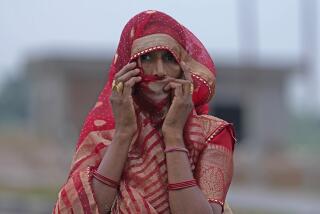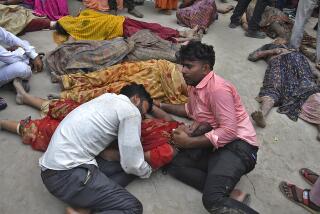Temple Supporters March in India
- Share via
AYODHYA, India — The power of compromise and a heavy police crackdown prevented religious violence here Friday when Hindu nationalists delivered two carved stones for a temple they want to build on the site of a demolished mosque.
Indian police detained more than 18,000 people in at least three states and cordoned off the northern town of Ayodhya to avert a new wave of violence in a country still shaken by the deaths of more than 650 people in Hindu-Muslim riots in recent weeks.
But Ashok Sanghal, international president of the hard-line Vishwa Hindu Parishad group, insisted that there will be no backing down from the ultimate goal of building a temple on the site, which the VHP claims is the birthplace of Lord Rama, an incarnation of the Hindu god Vishnu.
“We will get an opportunity to build the temple, I’m sure--very sure,” Sanghal said as about 70 supporters of the Ram temple movement held a short procession through Ayodhya.
The VHP had planned to march at least 10,000 devotees through Ayodhya, but 8,000 police and paramilitary forces closed off the town to all but a few dozen hard-liners, who were stopped short of the disputed site where the 16th century mosque was taken apart by a Hindu mob in December 1992.
The group’s elderly spiritual leader, Ramchandra Das Paramhans, had said he would risk death to insist on Hindus’ right to pray on undisputed government land next to the site of the former mosque. But in the end, he did what the government and police told him to do.
Das’ followers delivered two carved stones for their planned temple to the holy man’s residence here. Each sandstone piece was about a yard wide and came from a workshop where masons continued to chip away at pillars and other parts of the proposed Hindu temple Friday.
The stones, called shilas, were then handed over to a representative of Indian Prime Minister Atal Behari Vajpayee “for safekeeping,” but only after Sanghal stood atop a car for about half an hour to calm his angry supporters.
“There was no compromise,” Sanghal said before the ceremony, stressing his view that Vajpayee is an ally of the Ram temple movement, not an enemy. “The shilas will be handed over to the central government, which now looks after the entire temple. They’ll keep them somewhere secure. I’m very happy.”
The temple activists had wanted to go about another half a mile past Das’ residence to the site of the mosque. But India’s Supreme Court banned any religious ceremonies on a 67-acre site that includes the spot where the mosque once stood.
Das had threatened to defy the court order and hold a symbolic prayer ceremony, or puja, at the site, but he agreed to a last-minute compromise.
Sanghal blamed the disappointing development on journalists, who had turned out in such large numbers to cover the confrontation that they almost outnumbered the Hindu devotees marching through town.
“Journalists hinder puja!” Sanghal shouted to the angry crowd.
“Uncle,” a supporter cried out to Sanghal in respect, “when will the Ram temple be built?”
“Shut up,” Sanghal scolded the man. “Who are you? Aren’t you going to listen to Ashok Sanghal?”
By keeping its radical followers in line Friday, the VHP proved that it can control potentially violent mobs when it chooses.
Human rights activists, opposition politicians and Muslim leaders have accused the organization of leading Hindu attacks in the recent unrest, which began when a Muslim mob set fire to a train Feb. 27. The blaze killed 58 people and sparked India’s worst communal violence since Ayodhya’s mosque, the Babri Masjid, was demolished.
In Ahmadabad, site of much of the violence, police said today that they shot two Muslim men dead overnight in separate incidents when they fired to disperse clashing Hindus and Muslims. They said a 20-year-old Hindu was stabbed to death and his father wounded by unidentified assailants.
Vajpayee’s Hindu nationalist Bharatiya Janata Party has close links to the Ram temple movement, and although the prime minister has repeatedly said he will let the courts decide the fate of the site of the razed mosque, opposition parties accuse him of siding with Hindu hard-liners.
As they prepared for their procession to Das’ residence, some of the holy man’s followers chanted anti-Muslim slogans, such as one that proclaimed India a place for Hindus and the Hindi language and taunted, “Circumcised men should go to Pakistan.”
Pakistan, India’s majority Muslim neighbor, is a favorite target of Hindu nationalists, who have used the current threat of war with Pakistan to mobilize support for their view that only Hinduism is a force for unity and strength in India.
They also cite the period during which Muslim Mughal emperors ruled India as a time of humiliating, destructive assault on Hindu culture. They say they are still working to reverse the damage by insisting on Hindu dominance in a country where Muslims make up an estimated 140 million of the 1-billion population.
“Thirty thousand [Hindu] temples were destroyed by the Muslims,” Sanghal said, as about 15 guards from the Indo-Tibetan Border Police, who normally protect India’s frontier with China, guarded him in Ayodhya with AK-47 assault rifles.
“And we have not destroyed even a single mosque in this country,” he insisted. “This is our history, a history of tolerance and nonviolence.”
“What about Babri in 1992?” a reporter asked.
“Babri was not a masjid [mosque],” Sanghal snapped. “It was actually a functioning [Hindu] temple by order of the court.”
More to Read
Sign up for Essential California
The most important California stories and recommendations in your inbox every morning.
You may occasionally receive promotional content from the Los Angeles Times.













